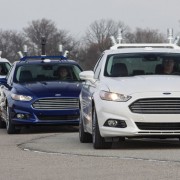Google is Looking to Hire a Few Good Autonomous Test Drivers
Jennifer van der Kleut
Can’t wait for the day to come when you get to slip into the front seat of a driverless car?
That day could be tomorrow-or, at least, one day very soon.
Google has placed an online job ad on the site Glassdoor.com indicating they wish to hire test drivers for their fleet of self-driving cars.
Of course, there’s more to the job than just taking the test cars for daily spins. The job listing says the “vehicle safety specialists” will be expected to collect data for the project engineers, and reconcile safety systems to work in harmony for all other systems within the cars.
The specialists will also participate in design reviews to help ensure that all safety systems are working efficiently.
Ideal candidates will possess a bachelor’s degree in computer science, engineering or other related field, as well as at least five years of experience in related engineering work include hazard analyses. And of course, knowledge of automotive systems is a major plus.
Since 2009, Google has been hard at work developing its self-driving car systems, and has logged more than 1 million test miles. Though Google logged its first at-fault accident on Valentine’s Day of this year, it continues to expand its program. In addition to driving around its main headquarters in Silicon Valley, their test cars can also be seen on the roads in Austin, Texas and Kirkland, Washington today.
Most recently, Google appeared before Congress last week to discuss the merits of self-driving vehicle technology, and to discuss how the government can better remove legislative obstacles to getting the technology to market.
Though the Department of Transportation has expressed eagerness in helping self-driving technology progress, their most recent report indicates they still think autonomous cars should include traditional features like steering wheels and brake pedals-much to the disappointment of companies like Google, whose test cars have neither-as well as driver’s seats.
Not long after that report was released, and after the hearing with Congress took place, top Google executive Chris Urmson sent an informal letter to the federal government proposing that self-driving cars should be legal to drive on public roads, and should be legal to sell to consumers, if the cars can pass a road safety test, proving they are up to federal safety standards.

